#i say some users but i've mostly just seen two instances of someone mentioning something in the tag
Text
On using the #Fragari_Art tag on Twitter
It seems that a few JP users on Twitter have been getting irritated by the use of the #Fragari_Art tag on Twitter by mostly fans from outside JP.
They're not against fans outside JP posting fanart, of course, but in the JP fanbase, there's generally rules that are followed when it comes to using main tags. Generally, the criteria is:
OK to use tag:
Fanart of the Fragaria Memories characters
Fanart of the knights and their lords together (as long as it isn't shipping art)
Manga/comics of the characters (as long as it isn't shipping)
Joke fanart
Duo/trio/group fanart (as long as it isn't shipping)
Not OK to use tag:
Shipping fanart (this includes both canon/canon and canon/OC, anything even hinting at shipping is generally avoided from being tagged it seems)
Fanart of OCs (including yume characters)
Fanart of girls (probably? I'm not quite sure what the tweet I'm referencing means by this, but considering it's a joseimuke at heart it's probably exactly what it says)
These rules are generally followed across each fanbase on JP Twitter, by the way, it's not just a Fragaria Memories thing. I know that artists just want their art to be seen by as many people as possible, which is completely fair. But it's just the way that JP users curate their experience in the fanbase. You see this a lot on Pixiv; shipping art won't be tagged with the series they're from.
Also notably, the #Fragari_Art tag is an official tag that was created by the company itself, so it seems like some users are worried that the company may even prohibit the creation of fan content altogether if people keep misusing the tag. I'm not sure how based in reality this worry it, but considering how trigger-happy the company is with lawsuits, I don't doubt it.
Edit: People aren't asking people to delete their art if they've used the tag or anything, it's more just a plea to be more mindful of using the tag in the future. (Nor is this aimed at anyone in particular, since there are quite a few fans outside of JP that do follow the rules.)
#fragaria memories#i say some users but i've mostly just seen two instances of someone mentioning something in the tag#jp fans are generally too polite to say anything directly to you as well esp with language barriers#so they'll just stew on their feelings and wonder why fans outside jp aren't noticing they're the only ones posting shipping/oc/yume fanart#also it's not exclusively non-jp fans doing it but... it is mostly non-jp fans
53 notes
·
View notes
Note
These are questions I've had for some while and it's hard to find someone who'll answer with grace. This mostly relates to disabilities (mental or physical) in fiction.
1) What makes a portrayal of a disability that's harming the character in question ableist?
2) Is there a way to write a disabled villain in a way that isn't ableist?
In the circles I've been in, the common conceptions are you can't use a character's disability as a plot point or showcase it being a hindrance in some manner. heaven forbid you make your villain disabled in some capacity, that's a freaking death sentence to a creative's image. I understand historically villains were the only characters given disabilities, but (and this is my personal experience) I've not seen as many disabled villains nowadays, heck, I see more disabled heroes in media nowadays.
Sorry if this comes off as abrasive, I'd really like to be informed for future media consumption and my own creative endeavors.
Okay so the first thing I'm going to say is that while it IS a good idea to talk to disabled people and get their feedback, disabled people are not a monolith and they aren't going to all have the same take on how this goes.
My personal take is biased in favor that I'm a neurodivergent person (ADHD and autism) who has no real experience with physical disabilities, so I won't speak for physically disabled people- heck, I won't even speak for every neurotype. Like I say, people aren't a monolith.
For myself and my own writing of disabled characters, here's a couple of concepts I stick by:
Research is your friend
Think about broad conventions of ableism
Be mindful of cast composition
1. Research is your friend
Yeah this is the thing everybody says, so here's the main bases I try to cover:
What's the story on this character's disability?
Less in terms of 'tragic angst' and more, what kind of condition this is- because a congenital amputee (that is to say, someone who was born without a limb) will have a different relationship to said limb absence than someone who lost their limb years ago to someone who lost their limb yesterday. How did people in their life respond to it, and how did they respond to it? These responses are not "natural" and will not be the same to every person with every worldview. This can also be a great environment to do worldbuilding in!
Think about the movie (and the tv series) How To Train Your Dragon. The vikings in that setting don't have access to modern medicine, and they're, well, literally fighting dragons and other vikings. The instance of disability is high, and the medical terminology to talk about said disabilities is fairly lackluster- but in a context where you need every man you possibly can to avoid the winter, the mindset is going to be not necessarily very correct, but egalitarian. You live in a village of twenty people and know a guy who took a nasty blow to the head and hasn't quite been the same ever since? "Traumatic Brain Injury" is probably not going to be on your lips, but you're also probably going to just make whatever peace you need to and figure out how to accommodate Old Byron for his occasional inability to find the right word, stammers and trembles. In this example, there are several relevant pieces of information- what the character's disability is (aphasia), how they got it (brain injury), and the culture and climate around it (every man has to work, and we can't make more men or throw them away very easily, so, how can we make sure this person can work even if we don't know what's wrong with them)
And that dovetails into:
What's the real history, and modern understandings, of this?
This is where "knowing the story" helps a lot. To keep positing our hypothetical viking with a brain injury, I can look into brain injuries, what affects their extent and prognosis, and maybe even beliefs about this from the time period and setting I'm thinking of (because people have had brains, and brain injuries, the entire time!) Sure, if the setting is fantastical, I have wiggle room, but looking at inspirations might give me a guide post.
Having a name for your disorder also lets you look for posts made by specific people who live with the condition talking about their lives. This is super, super important for conditions stereotyped as really scary, like schizophrenia or narcissistic personality disorder. Even if you already know "schizophrenic people are real and normal" it's still a good thing to wake yourself up and connect with others.
2. Think about broad conventions of ableism
It CAN seem very daunting or intimidating to stay ahead of every single possible condition that could affect someone's body and mind and the specific stereotypes to avoid- there's a lot under the vast umbrella of human experience and we're learning more all the time! A good hallmark is, ableism has a few broad tendencies, and when you see those tendencies rear their head, in your own thinking or in accounts you read by others, it's good to put your skeptical glasses on and look closer. Here's a few that I tend to watch out for:
Failing the “heartwarming dog” test
This was a piece of sage wisdom that passed my eyeballs, became accepted as sage wisdom, and my brain magnificently failed to recall where I saw it. Basically, if you could replace your disabled character with a lovable pet who might need a procedure to save them, and it wouldn’t change the plot, that’s something to look into.
Disability activists speak often about infantilization, and this is a big thing of what they mean- a lot of casual ableism considers disabled people as basically belonging to, or being a burden onto, the able-bodied and neurotypical. This doesn’t necessarily even need to have an able neurotypical in the picture- a personal experience I had that was extremely hurtful was at a point in high school, I decided to do some research on autism for a school project. As an autistic teenager looking up resources online, I was very upset to realize that every single resource I accessed at the time presumed it was talking to a neurotypical parent about their helpless autistic child. I was looking for resources to myself, yet made to feel like I was the subject in a conversation.
Likewise, many wheelchair users have relayed the experience of, when they, in their chair, are in an environment accompanied by someone else who isn’t using a chair, strangers would speak to the standing person exclusively, avoiding addressing the chair user.
It’s important to always remind yourself that at no point do disabled people stop being people. Yes, even people who have facial deformities; yes, even people who need help using the bathroom; yes, even people who drool; yes, even people whose conditions impact their ability to communicate, yes, even people with cognitive disabilities. They are people, they deserve dignity, and they are not “a child trapped in a 27-year-old body”- a disabled adult is still an adult. All of the “trying to learn the right rules” in the world won’t save you if you keep an underlying fear of non-normative bodies and minds.
This also has a modest overlap between disability and sexuality in particular. I am an autistic grayromantic ace. Absolutely none of my choices or inclinations about sex are because I’m too naive or innocent or childlike to comprehend the notion- disabled people have as diverse a relationship with sexuality as any other. That underlying fear- as mentioned before- can prevent many people from imagining that, say, a wheelchair user might enjoy sex and have experience with it. Make sure all of your disabled characters have full internal worlds.
Poor sickly little Tiffany and the Red Right Hand
A big part of fictional ableism is that it separates the disabled into two categories. Anybody who’s used TVTropes would recognize the latter term I used here. But to keep it brief:
Poor, sickly little Tiffany is cute. Vulnerable. How her disability affects her life is that it constantly creates a pall of suffering that she lives beneath. After all, having a non-normative mind or body must be an endless cavalcade of suffering and tragedy, right? People who are disabled clearly spend their every waking moment affected by, and upset, that they aren’t normal!
The answer is... No, actually. Cut the sad violin; even people who have chronic pain who are literally experiencing pain a lot more than the rest of us are still fully capable of living complex lives and being happy. If nothing else, it would be literally boring to feel nothing but awful, and people with major depression or other problems still, also, have complicated experiences. And yes, some of it’s not great. You don’t have to present every disability as disingenuously a joy to have. But make a point that they own these things. It is a very different feeling to have a concerned father looking through the window at his angel-faced daughter rocking sadly in her wheelchair while she stares longingly out the window, compared to a character waking up at midnight because they have to go do something and frustratedly hauling their body out of their bed into their chair to get going.
Poor Sickly Little Tiffany (PSLT, if you will) virtually always are young, and they virtually always are bound to the problems listed under ‘failing the heartwarming dog’ test. Yes, disabled kids exist, but the point I’m making here is that in the duality of the most widely accepted disabled characters, PSLT embodies the nadir of the Victim, who is so pure, so saintly, so gracious, that it can only be a cruel quirk of fate that she’s suffering. After all, it’s not as if disabled people have the same dignity that any neurotypical and able-bodied person has, where they can be an asshole and still expect other people to not seriously attack their quality of life- it’s a “service” for the neurotypical and able-bodied to “humor” them.
(this is a bad way to think. Either human lives matter or they don’t. There is no “wretched half-experience” here- if you wouldn’t bodily grab and yank around a person standing on their own feet, you have no business grabbing another person’s wheelchair)
On the opposite end- and relevant to your question- is the Red Right Hand. The Red Right Hand does not have PSLT’s innocence or “purity”- is the opposite extreme. The Red Right Hand is virtually always visually deformed, and framed as threatening for their visual deformity. To pick on a movie I like a fair amount, think about how in Captain America: The Winter Soldier, the title character is described- “Strong. Fast. Had a metal arm.” That’s a subtle example, but, think about how that metal arm is menacing. Sure, it’s a high tech weapon in a superhero genre- but who has the metal arm? The Winter Soldier, who is, while a tormented figure that ultimately becomes more heroic- scary. Aggressive. Out for blood.
The man who walks at midnight with a Red Right Hand is a signal to us that his character is foul because of the twisting of his body. A good person, we are led to believe, would not be so- or a good person would be ashamed of their deformity and work to hide it. The Red Right Hand is not merely “an evil disabled person”- they are a disabled person whose disability is depicted as symptomatic of their evil, twisted nature, and when you pair this trope with PSLT, it sends a message: “stay in your place, disabled people. Be sad, be consumable, and let us push you around and decide what to do with you. If you get uppity, if you have ideas, if you stand up to us, then the thing that made you a helpless little victim will suddenly make you a horrible monster, and justify us handling you with inhumanity.”
As someone who is a BIG fan of eldritch horror and many forms of unsettling “wrongness” it is extremely important to watch out for the Red Right Hand. Be careful how you talk about Villainous Disability- there is no connection between disability and morality. People will be good, bad, or simply just people entirely separate from their status of ability or disability. It’s just as ableist to depict every disabled person as an innocent good soul as it is to exclusively deal in grim and ghastly monsters.
Don’t justify disabilities and don’t destroy them.
Superpowers are cool. Characters can and IMO should have superpowers, as long as you’re writing a genre when they’re there.
BUT.
It’s important to remember that there is no justification for disabilities, because they don’t need one. Disability is simply a feature characters have. You do not need to go “they’re blind, BUT they can see the future”
This is admittedly shaky, and people can argue either way; the Blind Seer is a very pronounced mythological figure and an interesting philosophical point about what truly matters in the world. There’s a reason it exists as a conceit. But if every blind character is blind in a way that completely negates that disability or makes it meaningless- this sucks. People have been blind since the dawn of time. And people will always accommodate their disabilities in different ways. Even if the technology exists to fix some forms of blindness, there are people who will have “fixable” blindness and refuse to treat it. There will be individuals born blind who have no meaningful desire to modify this. And there are some people whose condition will be inoperable even if it “shouldn’t” be.
You don’t need to make your disabled characters excessively cool, or give them a means by which the audience can totally forget they’re disabled. Again, this is a place where strong worldbuilding is your buddy- a handwave of “x technology fixed all disabilities”, in my opinion, will never come off good. If, instead, however, you throw out a careless detail that the cool girl the main character is chatting up in a cyberpunk bar has an obvious spinal modification, and feature other characters with prosthetics and without- I will like your work a lot, actually. Even if you’re handing out a fictional “cure”- show the seams. Make it have drawbacks and pros and cons. A great example of this is in the series Full Metal Alchemist- the main character has two prosthetic limbs, and not only do these limbs come with problems, some mundane (he has phantom limb pains, and has to deal with outgrowing his prostheses or damaging them in combat) some more fantastical (these artificial limbs are connected to his nerves to function fluidly- which means that they get surgically installed with no anesthesia and hurt like fuck plugging in- and they require master engineering to stay in shape). We explicitly see a scene of the experts responsible for said limbs talking to a man who uses an ordinary prosthetic leg, despite the advantages of an automail limb, because these drawbacks are daunting to him and he is happier with a simple prosthetic leg.
Even in mundane accommodations you didn’t make up- no two wheelchair users use their chair the exact same way, and there’s a huge diversity of chairs. Someone might be legally blind but still navigate confidently on their own; they might use a guide dog, or they might use a cane. They might even change their needs from situation to situation!
Disability accommodations are part of life
This ties in heavily to the previous point, but seriously! Don’t just look up one model of cane and superimpose it with no modifications onto your character- think about what their lifestyle is, and what kind of person they are!
Also medication is not the devil. Yes, medical abuse is real and tragic and the medication is not magic fairy dust that solves all problems either. But also, it’s straight ableism to act like anybody needing pills for any reason is a scary edgy plot twist.
(and addiction is a disease. Please be careful, and moreover be compassionate, if you’re writing a character who’s an addict)
3. Be mindful of cast composition
This, to me, is a big tip about disability writing and it’s also super easy to implement!
Just make sure your cast has a lot of meaningful disabled characters in it!
Have you done all the work you can to try and dodge the Red Right Hand but you’re still worried your disabled villain is a bad look? They sure won’t look like a commentary on disability if three other people in the cast are disabled and don’t have the same outlook or role! Worried that you’re PSLT-ing your main character’s disabled child? Maybe the disability is hereditary and they got it from the main character!
The more disabled characters you have, the more it will challenge you to think about what their individual relationship is with the world and the less you’ll rely on hackneyed tropes. At least, ideally.
-
Ultimately, there’s no perfect silver bullet of diversity writing that will prevent a work from EVER being ableist, but I hope this helped, at least!
190 notes
·
View notes
Text
Why Sherlock Holmes FGO is Sus: Theories and More
Before I begin, I’d like to give thanks to my wonderful friend for all the points, art, and info searching that have been made to produce this piece, I can’t appreciate you enough for the effort you put in. 🥺🙏💕
Alright now on to it!
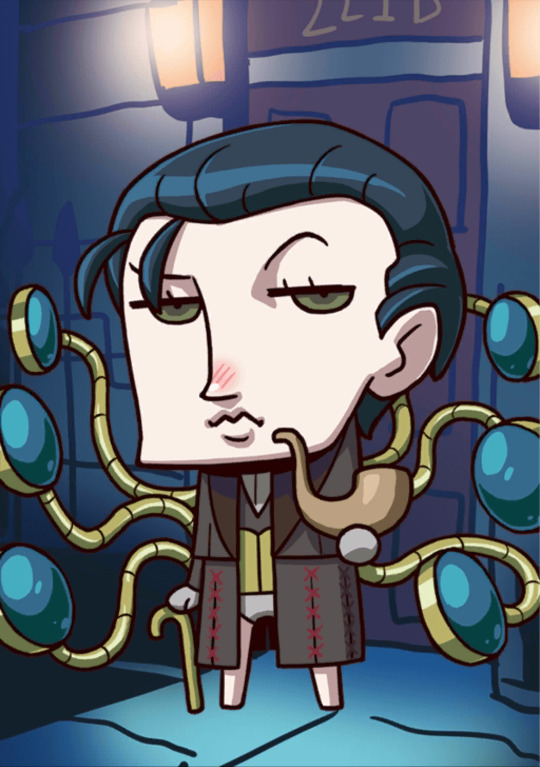
INTRODUCTION: Humble Beginnings (Identification of the Abnormal)
If you’ve played the app Fate/Grand Order for a while you’d know about the Heroic Spirit we first encounter in a hole within Camelot’s dessert whilst going to the Atlas Institute. Smart, handsome looking, and sharp enough to discern our True Name, this man of mystery has been seen as an oddball by many long time players of the game. There are many aspects about him that raise doubt about his credibility, is he truly what he wants us to think he is? That servant is Sherlock Holmes (Ruler) and there are many theories about him having some secrets, about him either being a Foreigner class, Beast class, or something else entirely. We are attempting to catalogue all this information in one place for maximum clarity.
SECTION 1: Other Character’s Reaction (First Impression is the Best Impression) *WARNING LOSTBELT 1 AND 2 SPOILERS AHEAD*
From the first encounter in Camelot right until the end of Lostbelt 2, there are many instances of characters reacting to his presence in….interesting ways.
Bedivere, when first coming in contact with Holmes in Camelot says that "I suppose I've never really been good with people like him. He reminds me of Merlin."
It could refer to the mysterious manner in which both Holmes and Merlin conduct themselves, but better to keep in mind that Merlin is a Grand Caster, and that he manifests as a servant due to specific circumstances (he is not dead).
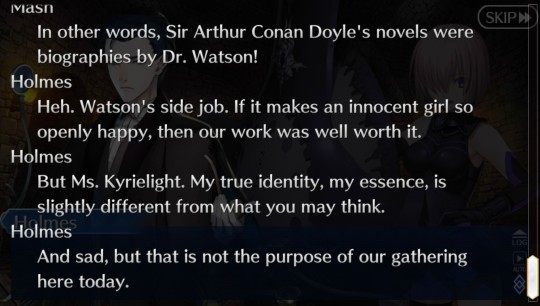
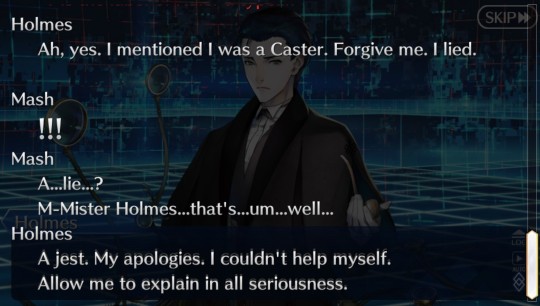
In Camelot, Mash assumes that Holmes must be Caster class and that the original novels by Sir Arthur Conan Doyle must have been biographies penned by Dr. Watson under a pen name. Holmes corrects her, saying that: "My true identity, my essence, is slightly different from what you may think. And sad, but that is not the purpose of our gathering here today."
This dilemma is also present in the Sherlock Holmes Trial Quest (which mostly tackles the debate of whether he's a fictional character or someone who actually existed). Holmes has a line where he says:
"Ah, yes. I mentioned I was a Caster. Forgive me, I lied."
This is however immediately followed up by:
"A jest. My apologies. I couldn't help myself."
This sort of backpedalling raises a doubt as to whether he was really Caster class before, so the nature of his former class is still a mystery. He later mentions that his Ruler class is the World telling him that not all illusions and dreams need to be laid bare.

When meeting with Salieri in Lostbelt 1, Holmes introduces himself as such:"I'm Sherlock Holmes, Chaldea's administrative advisor. I became a servant through unusual means, just like you."
Salieri was only summonable as a servant because of his reputation caused by the fact that he killed Mozart. He is under the effect of Innocent Monster. It can also be said that Salieri is a lostbelt servant and is significantly more sane than he would have been in a normal summoning, that was the unusual summoning that Holmes was refering to. Does this mean Holmes is not from Proper Human History?
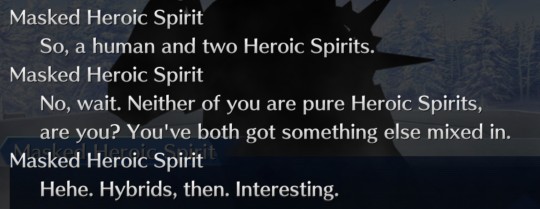
Sigurd (who's under the control of Surtur), while attacking us in Lostbelt 2 says this: "So, a human and two Heroic Spirits. No, wait. Neither of you are pure Heroic Spirits, are you? You've both got something else mixed in. Hehe, hybrids then. Interesting"
This is in reference to Holmes and Mash, who are alongside the master at this moment. Mash is a demiservant (human+servant) hence the "Hybrid" comment makes sense, but Holmes? What is the "something else" mixed in with Holmes?
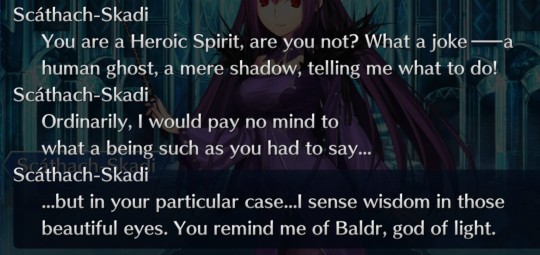

Later in LB2, Holmes requests the assistance of Scáthach-Skadi in beating Surtur. Skadi says that normally she would never pay mind to what a mere Heroic Spirit had to say but: "...but in your particular case…I sense wisdom in those beautiful eyes. You remind me of Baldr, god of light." Quite a bit later, she also has this to say:"Perhaps those piercing eyes of yours in fact surpass Odin's? Mystic Eyes, perchance? ….No, that's not it. They merely reflect your wisdom born of human history's cumulative accomplishments."
She says that's not it, but the fact that it was the first thing she thought of shouldn't be ignored.
Baldr is the god of light. Holmes' attacks consist of beams of light, and his cane lights up when he's using it in battle.
In Norse legends, Odin is said to have sacrificed one eye to the spring of Mimir in order to get ancient wisdom, the ability to perceive everything in the world.
SECTION 1.5: More Reactions (From JP Only)
Since it is JP only and there is no official translation for NA yet, this information cannot be 100% confirmed in any way. (Most of this is from Reddit translation done by fans). But as these are also important, it's best to put this information separate section.
Moriarty's interlude involves him finding a micro-singularity in London. At some point the transmission between Chaldea and the master gets cut and Moriarty reveals he created this scenario, made the singularity and everything to get one on one time with the master. He tells us not to trust Holmes. When the time comes, we as master should choose Moriarty over Holmes.
It has to be kept in mind that Moriarty is not a good guy, he is a character created entirely to oppose Holmes so it is natural that he doesn't trust him. For all we know, it is just emotional manipulation.
Moriarty's very nature is tied to being the antithesis of Holmes. Holmes might theoretically go against us for the sake of humanity while also trying to keep us safe (the master is in a way, a Watson replacement to him after all) while Moriarty would gladly let humanity burn for the sake of us but also for the sake of being completely opposite to Holmes and keeping his identity as such.
However he does raise valid points, how was Holmes able to rayshift? This part was never explained, and he also mentions that his hypothesis has a fatal contradiction in the fact that Holmes risked his life to save ours. What can be inferred from this is that Holmes is a good man and is on our side, but there is something very weird about him that should not be ignored.
In Lostselt 5 it is mentioned at one point that Zeus called Holmes dangerous, he mustn't look at Zeus or the other gods and that his eyes are enemies of the world.
It has to be mentioned that this is some heavy emphasis on Holmes' eyes (Skadi mentioned Holmes' eyes twice, and she was a god as well). Is it because of the nature of Holmes that he is the one that reveals all truth? Is that in some way detrimental to gods, magic and the world in general?
Recently, from Holmes' skill upgrade interlude there was a section about Holmes saying that he is always an ally of justice and that while he may be on our side, he is still capable of evil but it doesn't change the fact that he is our ally. Even then it seems he has some secrets that can't be understood by himself.
By now with the presence of Dr. Jekyll and Helena and their recounts on what happened, it is confirmed that Holmes was actually "alive"(?)
Some of the adventures penned by Dr. Watson were actually censored versions of the original happenings, which were magical in nature.
Holmes was traumatised(?) by Helena's death back when they were both alive. He swears he would never let that happen again. (remember what happened in lostbelt 2…)
It seems that Holmes himself is not fully sure of what is secret about him. Since he utterly dislikes talking about something without being 100% sure about it (this tendency of his has gotten us in trouble before) plus his general secretive nature, it can be said that this is why he wouldn't talk about that.
SECTION 2: Weird Things That Holmes Does (And Other Questions)
Heroic Spirits are anything but normal, but there are few servants who break the norm even further, and Holmes is one of them.
Holmes is able to Rayshift (presumably) from London, to Camelot, and then to Shinjuku. There are very few servants who are able to manifest themselves.
Musashi also appears here and there, but it's not a deliberate choice on her part. She is not able to predetermine her next destination.
Arthur travels from a parallel world to this world, but this is due to "chasing after a certain powerful antagonist, evil omen" - so he tells.
Beast class has the skill of Independent Manifestation which would allow the servant to manifest anywhere they'd want. Merlin, Tamamo Vitch and Shiki possess it. However, it has to be noted that Holmes' rayshifts have a significant toll on his saint graph, as he is unable to fight or defend himself by the time we meet him in Camelot. While normal Independent Manifestation shouldn't lead to the depletion of the user's saint graph. Holmes' class is unknown at the time of his rayshifting.
At the time of summoning, Heroic Spirits usually reveal their class and True Name (there also are exceptions to the rule). At the time of his summoning, Holmes doesn't reveal his Class: "Are introductions necessary? I am a detective. If you were expecting a hero, my apologies...But if you wanted a detective or an investigator, you drew the right card."
In the case of EOR Servants whose names haven't been found, they reveal their class.
Who summoned Holmes? The only thing we know regarding his presence was that it was first clearly there when he tampered with information in London.
Holmes' illustrator is Yamanaka Kotetsu, who was also the illustrator of the beasts Tiamat and Goetia
The artists who design and illustrate the characters tend to do it in groups of servants who are related to each other in some way (Pako with Arjuna and Karna Chacha and Nobunaga; Miwa Shiro with Brynhildr and Sigurd). It is strange that Kotetsu designed only Holmes, Tiamat and Goetia.
(NEW ADDITION) It should also be noted that as an illustrator Kotetsu has had previous works in a Lovecraftian Guidebook and is also the artist to the Alien God Preistess, somewhat showing how their work leans more to the outerworldly.
SECTION 3: The Design
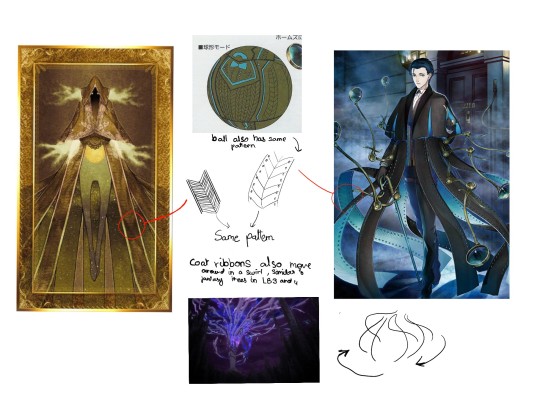
It is a very commonly noticed fact that Holmes' coat in his third ascension has a very similar shape to that of the Foreigner card artwork.
The pattern work on the coattails of the foreigner art and the inside (blue) part of Holmes' coattails have a very similar, if not exactly same pattern running down the entire length of it. The sphere summoned in Holmes' Noble Phantasm also has the same pattern on its sides and front.
There is a "fog" around Holmes in his third ascension, which is reminescent of the smoke in the card art. (Also can be the London smog).
The glowing section of the abdomen of the being reminds one of the metallic corset that Holmes wears.
There are 4 notches of smoke on either side of the being (total 8), under their cape. If we stretch our interpretation, then it could mean Holmes' arms and the metal arms that he has is also equal to 8.
In that tangent, the shape of the coat is also similar to that of Saver class Buddha, the fantasy trees from Lostbelt 3 and 4, and the Shadows made by the 6th imaginary element.
The Endless Knot / Shrivatsa symbol on his shoulders is one of the many references of his connection to Tibet (faking his death after the Final Problem). It is an important symbol in both Jainism and Buddhism.
Some of its interpretations include:
The eternal continuum of mind.
The union of wisdom and method.
Since the knot has no beginning or end it also symbolizes the wisdom of the Buddha
the endless cycle of suffering or birth, death and rebirth within Tibetan Buddhism.

The cane that Holmes wields has a pattern on its handle in the shape of a Prayer Wheel.
However, we are not able to find the meaning behind the script on the cane. Both of us attempted to translate it but failed. If anyone can translate the meaning it would be greatly appreciated.
The holographic books in the base of the unidentified sphere have a pattern on their front that greatly resembles a lotus.
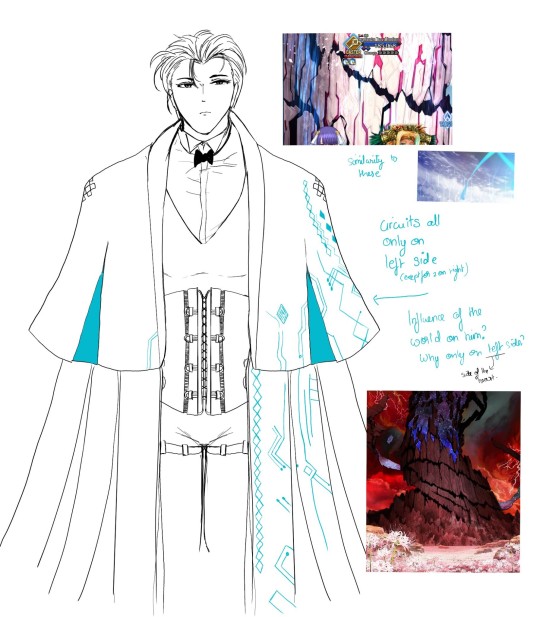
In Holmes' third ascension, there are a number of magical circuits on his coat.
The circuits are almost only on his left side, with very few circuits on his right side. It's not like it was woven into it, were that the case the circuits would have been all over his coat in a more even distribution. It's almost like an impact radius.
The circuits are very similar to the ones visible on the title screen of the lostbelts, as well as the patterns seen on the fantasy trees.
CONCLUSION SECTION: Something's Up (It's Big Brain Time)
It's clear that something is very strange about Holmes, from his interactions to his design, it's clear that there is too much effort into throwing these hints that it's not just a red herring.
Is he a Foreigner? Beast? Counter Guardian? Some other unknown extra class? It cannot be said at the moment. Holmes' role as a revealer itself is dangerous to mystery and magic, so it can be anything.
It is also not necessarily true that just because Holmes has all these abnormalities, that he will betray us, or is on the side of evil. When has there been a clear cut side of good or evil anyway? It can be argued that we are the villains in some way, as we bring about the end of these timelines to safeguard our own proper human history.
Holmes has always been on the side of humanity and will continue to be, the question is what the reveal will be, why and how. That, only time and future chapters can answer, all we can do is speculate.
#fate#fate grand order#fgo#Sherlock Holmes#lostbelt spoilers#foreigner theories#fuccyoutumblrfuccyoutumblrfuccy#hope yall enjoyed!! feel free to give yalls thoughts!!#and again thank you soso much fremd🥺🥺🥺🙏🙏
278 notes
·
View notes